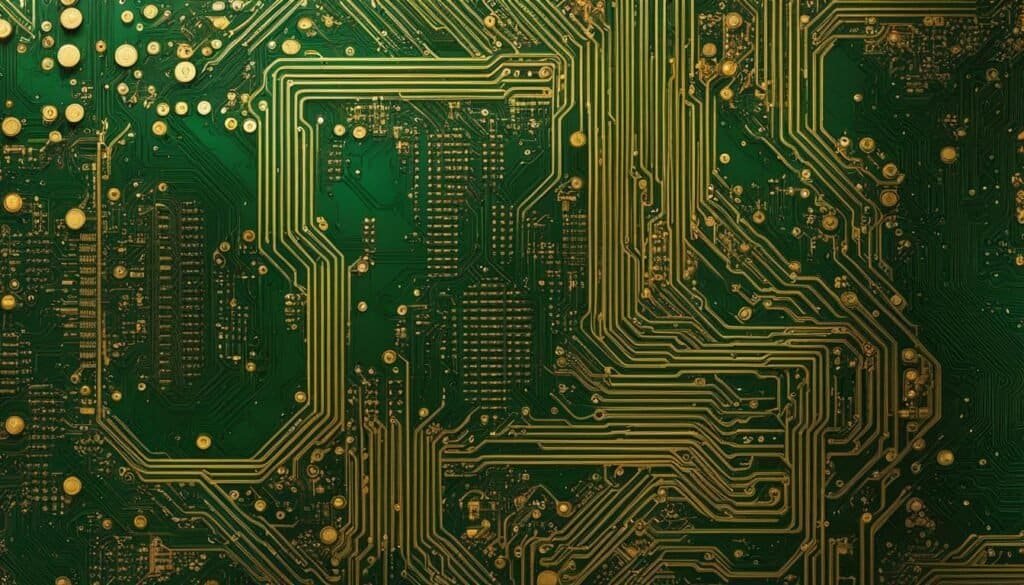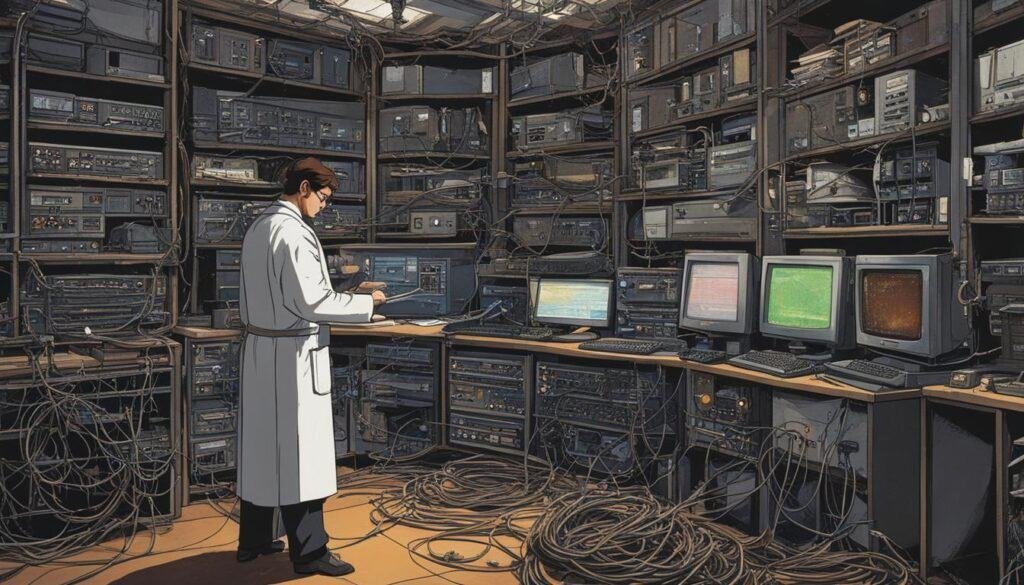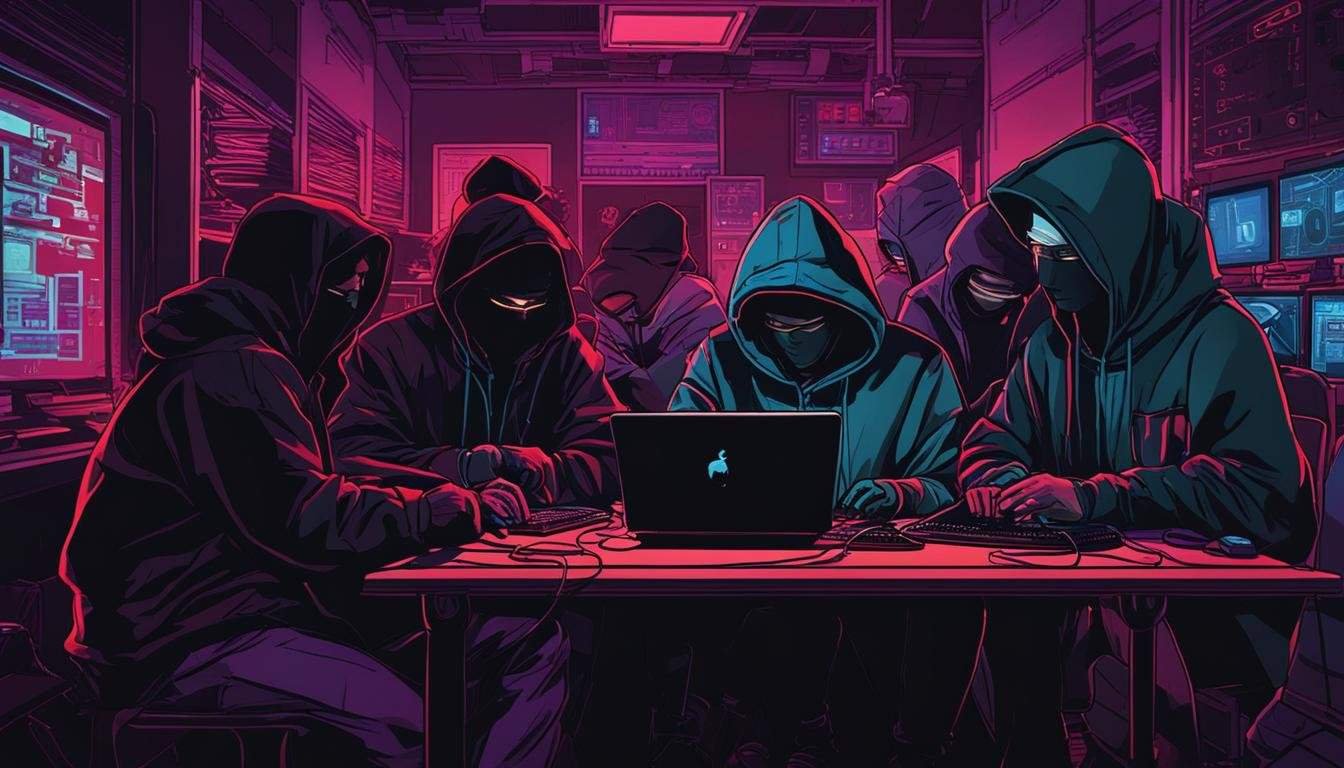Have you ever wondered who invented hacking? The history of hacking is a fascinating journey that takes us back in time to the early days of computing. From humble beginnings, hacking has evolved into a complex and ever-changing field that has had a profound impact on technology and society.
In this article, we’ll explore the pioneers of hacking and trace the history of its invention. We’ll dive into the stories of innovative individuals who pushed the boundaries of technology, and examine the impact that hacking has had on cybersecurity, privacy, and ethics.
Key Takeaways
- The origins of hacking can be traced back to the early days of computing.
- The pioneers of hacking paved the path for future generations to push the boundaries of technology.
- Hacking has had a profound impact on both technology and society.
- The evolution of hacking has led to changing methods, tools, and motivations.
- The legacy of hacking continues to shape our digital world, inspiring awe and concern as we navigate the complex landscape of cybersecurity.
The Birth of Hacking: Tracing the Origins
Welcome to the fascinating world of hacking, where we’ll take you on a journey through the history of hacking, its origin, and evolution. It’s important to understand where it all began to grasp the intricate components of hacking.
It was the 1960s when hacking emerged as a concept. In those days, computers were still in their infancy, and only a few people had access to them. MIT was one such place where computers were available, and a group of students started exploring the possibilities they offered. These students were dubbed “hackers.”
The word “hacker” was initially used in a positive sense to describe individuals who had an exceptional ability to solve complex computer problems. However, as time progressed, the term began to take on a more negative connotation.
“A hacker is someone who loves to program or who enjoys playful cleverness, or a combination of the two.” – Richard Stallman
The First Hackers: The Tech Revolutionaries
The first hackers were a group of tech-savvy individuals who experimented with computers to see what they could do. They were mostly based at MIT, where computers were still in their infancy. These individuals used their intellect to tinker with the machines, pushing them beyond their limitations and seeking innovative solutions to problems. Their enthusiasm and ingenuity laid the groundwork for what is now known as hacking.
One of the first notable hacks was performed by a group of MIT students in the ’70s. They hacked into the telephone system to make free long-distance calls. This was the first time that hacking had a criminal connotation, and it was not long before others began to use their skills for personal gain or to wreak havoc on computer systems.
Notable Tech Advances: The Precursors to Hacking
Before hacking became a concept, several innovations took place that would lay the groundwork for the techniques used by hackers. One of the first significant innovations was the creation of the transistor in 1947. The transistor allowed for the creation of faster and more efficient circuitry which made computers more powerful and accessible.
The invention of the integrated circuit in 1958 marked another milestone in computer history. This technology allowed for the creation of smaller and more powerful computers, making them available to a wider audience.
By the 1960s, computers had become a more common sight in workplaces and academic institutions. They had gained popularity as tools for solving complex mathematical problems and storing data. It was during this time that the first notable hacking incidents took place.
As you can see, the origins of hacking are deeply intertwined with the evolution of computing technology. It was a time of experimentation, innovation, and discovery, and the early hackers were at the forefront of this exciting new frontier.
Legendary Hackers: Pioneers in the Field
When it comes to the pioneers of hacking, there are several names that come to mind. These are the innovative individuals who pushed the boundaries of technology, showcasing their groundbreaking feats and contributions to the hacking community.
One such individual is Kevin Mitnick, who gained notoriety in the 1990s for his series of high-profile hacks. Known as the “Condor,” Mitnick was a master of social engineering, using his skills to gain access to some of the most secure computer systems in the world.
Another legendary hacker is Adrian Lamo, who gained recognition for his role in the high-profile breach of the New York Times in 2002. Lamo was known for his unconventional hacking methods, often relying on his exceptional memory and social engineering skills to carry out his attacks.
Of course, no discussion of hacking pioneers would be complete without mentioning Steve Wozniak, the co-founder of Apple. While Wozniak is best known for his contributions to the development of the personal computer, he was also a skilled hacker in his own right. In fact, it was his love of hacking that led him to develop the first Apple computer.
These are just a few of the many legendary hackers who have left their mark on the world of technology. From the early days of hacking to the present, these pioneers continue to inspire new generations of hackers and shape the evolution of this fascinating field.
Notable Hacking Incidents: Milestones in Hacking History
Throughout history, hacking has been a prominent and controversial topic, with numerous incidents that have shaped its evolution. Here, we explore some of the most significant hacking incidents that have occurred over the years.
| Year | Incident | Impact |
|---|---|---|
| 1988 | The Morris Worm | Considered the first large-scale cyber attack, the Morris Worm infected 6,000 computers and caused an estimated $10 million in damages. |
| 1995 | Kevin Mitnick’s Arrest | Kevin Mitnick, one of the most notorious hackers in history, was arrested after a lengthy FBI investigation. His case sparked debates about the ethics of hacking and government surveillance. |
| 2000 | The Love Bug Virus | The Love Bug virus affected millions of computers worldwide and caused billions of dollars in damages. It also raised concerns about the security of email and the need for stronger cybersecurity measures. |
| 2010 | Stuxnet | Stuxnet, a complex computer worm, was used to attack Iran’s nuclear program. It was one of the first examples of a state-sponsored cyber attack, signaling a new era in international relations and cyber warfare. |
| 2016 | The Yahoo Breach | The Yahoo data breach, which occurred in 2013 but was not discovered until 2016, affected over 1 billion user accounts and resulted in a $350 million reduction in Yahoo’s sale price to Verizon. |
These incidents have not only had significant financial impacts but have also highlighted the importance of cybersecurity and the need for stronger protections. As technology continues to advance, it is likely that we will see even more notable hacking incidents that shape the evolution of hacking.
Evolution of Hacking Techniques: From Script Kiddies to Sophisticated Threat Actors

Hacking has come a long way since its inception. As computing technology has advanced, so have hacking techniques. Hackers throughout history have continually adapted their methods to exploit vulnerabilities in new technologies and gain unauthorized access to computer systems.
In the early days of hacking, script kiddies and hobbyists dominated the scene. These individuals had a basic understanding of programming and network security, but their attacks were often unsophisticated and relatively harmless. However, as hacking evolved into a more serious threat, so too did the techniques used by hackers.
As computers became more prevalent in society, hackers began targeting larger organizations and governments. This led to the rise of professional hackers and cybercriminals who developed more sophisticated techniques to achieve their goals. The rise of the internet made it easier for hackers to collaborate and share information, leading to more advanced attacks.
Hacking Techniques Throughout History
Over the years, hackers have developed a variety of techniques to gain unauthorized access to computer systems. Some of the most notable techniques include:
| Technique | Description |
|---|---|
| Social engineering | Tricking individuals into revealing sensitive information or performing actions that compromise security. |
| Brute force attacks | Using automated software to crack passwords or encryption codes through trial and error. |
| Phishing | Sending fake emails or messages to trick individuals into revealing sensitive information or clicking on malicious links. |
| Malware | Inserting malicious software onto a computer system to gain access or steal information. |
| Zero-day exploits | Exploiting previously unknown vulnerabilities in software or hardware to gain unauthorized access. |
As technology continues to evolve, so too will the techniques utilized by hackers. It’s crucial for organizations and individuals to remain vigilant and informed about potential cyber threats to stay protected.
Hacking Innovations: Tools and Technologies
As hackers throughout history have become more sophisticated, they’ve developed and utilized an array of tools and technologies to aid in their endeavors. Some of the most notable innovations in the field of hacking include:
| Tool/Technology | Description |
|---|---|
| Packet Sniffers | Software designed to intercept and analyze network traffic, allowing hackers to identify vulnerabilities and steal data. |
| Keyloggers | Malware that records everything a user types, including passwords and sensitive information. |
| Remote Access Trojans (RATs) | Malware that allows hackers to gain remote access to a victim’s device, giving them control over the system and the ability to steal data or install additional malware. |
| Exploits | Software or code that takes advantage of vulnerabilities in software or hardware to gain unauthorized access. |
As technology has advanced, so have the tools and technologies used by hackers. Today, advanced persistent threats (APT) groups use highly sophisticated tools and techniques to infiltrate and remain undetected within target systems. Some notable APT groups include:
- APT10: A Chinese hacking group known for targeting companies in the technology, aerospace, and healthcare sectors.
- Cozy Bear: A Russian group responsible for a number of high-profile cyber attacks, including the 2016 hack of the Democratic National Committee’s servers.
- Lazarus Group: A North Korean hacking group believed to be responsible for the 2014 Sony Pictures hack and the WannaCry ransomware attack in 2017.
Despite the efforts of the cybersecurity industry, hackers continue to develop new tools and techniques to evade detection and successfully carry out attacks. As a result, the battle between hackers and security professionals is an ongoing one, with each side constantly adapting to stay one step ahead of the other.
The First Hacker: An Exploration of Early Pioneers

Who was the first hacker? The answer to this question is shrouded in mystery and subject to debate. While there is no conclusive evidence of the true origin of hacking, there are several early pioneers who paved the way for the hacking community we know today.
One of the earliest known hackers was John Draper, also known as Captain Crunch. In the 1970s, Draper discovered a way to manipulate a toy whistle found in Captain Crunch cereal boxes to produce a tone that could bypass phone company systems and make free phone calls. This technique, known as phone phreaking, became popular among early hackers.
Another early pioneer was Kevin Mitnick, who gained notoriety in the 1980s and 1990s for his hacking exploits. Mitnick was known for his social engineering tactics, which involved manipulating people into revealing sensitive information that he could use to gain access to computer systems.
| Pioneer | Contribution |
|---|---|
| John Draper | Discovered phone phreaking |
| Kevin Mitnick | Developed social engineering tactics |
Other notable early hackers include Robert Morris, who created the first computer worm, and Gary McKinnon, who hacked into several high-profile government systems in the early 2000s.
While these early pioneers may not have been the first hackers, they played a crucial role in shaping the hacking community and laying the groundwork for future generations of hackers to build upon.
The Legacy of Hacking: Impact on Technology and Society
Hacking has come a long way since its humble beginnings in the early days of computing. Through the years, it has evolved into a sophisticated and constantly evolving threat to cybersecurity.
One of the most significant impacts of hacking has been on the development of cybersecurity measures. As hackers developed new techniques and tools, security experts had to respond by creating new defenses. This constant back-and-forth has led to the creation of many of the cybersecurity practices and technologies that we rely on today.
Hacking has also played a role in shaping public perception of technology and cybersecurity. High-profile hacking incidents have made headlines and generated public debate about the risks and benefits of technology. This has led to increased awareness about the importance of cybersecurity and privacy, and sparked important discussions about ethics and regulation.
The Evolution of Hacking
The evolution of hacking has been a reflection of the changing landscape of technology and security. Hackers have gone from being largely solitary individuals to organized groups and even nation-state actors. The motivations behind hacking have also shifted, from curiosity and experimentation to financial gain and political or ideological aims.
As hacking has become more sophisticated, the tools and techniques used by hackers have become increasingly complex and often involve the use of cutting-edge technology. These tools are not only used by hackers but also by security researchers to test the vulnerabilities of systems and develop better defenses.
Notable Hackers Throughout History
Throughout history, there have been many notable hackers who have left their mark on the field. Some have been pioneers, developing new techniques and tools that have pushed the boundaries of what is possible. Others have been malicious actors who have caused significant harm through their actions.
Some of the most famous hackers throughout history include Kevin Mitnick, who gained notoriety in the 1990s for his sophisticated hacking techniques; Gary McKinnon, who hacked into NASA and the Pentagon in 2002; and Anonymous, a loosely organized group responsible for many high-profile cyberattacks in recent years.
The Impact of Hacking on Society
The impact of hacking on society has been both positive and negative. On the one hand, hacking has driven advances in technology and helped to create many of the innovations that we rely on today. On the other hand, hacking has also caused significant harm, including data breaches, financial fraud, and the disruption of critical infrastructure.
As hacking continues to evolve, it will be important for individuals and organizations to remain vigilant and stay informed about the latest threats and defenses. By working together, we can continue to push the boundaries of technology while also mitigating the risks posed by hacking.
Conclusion
While the question of who invented hacking may never have a definitive answer, our exploration into the origins, pioneers, and evolution of this field has shed light on its fascinating history and drastic impact on technology and society.
From the birth of hacking to legendary hackers, notable incidents, and the evolution of techniques and innovations, we have traced the complex and ever-changing landscape of hacking.
As we navigate the digital world and its cybersecurity concerns, the legacy of hacking continues to shape our understanding and approach to this complex field.
Ultimately, the question of who invented hacking may remain a mystery, but the impact and influence of this field are undeniable.
Thank you for joining us on this journey of exploration and discovery.
Is There a Connection Between Hacking Origins and Casino Heist Hacking Devices?
As hacking techniques evolve, experts are exploring possible connections between hacking origins and casino heist hacking devices. The intriguing question arises: Are these devices strategically placed in close proximity to casinos targeted for heists? Investigating the hacking device location for casino heist cases might uncover interesting patterns, shedding light on possible links between hackers and their targets.
FAQ
Who invented hacking?
The invention of hacking is not attributed to a single individual. It emerged as a concept during the early days of computing and evolved over time with contributions from various individuals.
What is the history of hacking?
Hacking has a rich history that can be traced back to the early days of computing. It has evolved alongside technology and has been shaped by key events, technologies, and individuals throughout the years.
Who are the pioneers of hacking?
There are several legendary hackers who can be considered pioneers in the field. These individuals have pushed the boundaries of technology and made significant contributions to the hacking community.
What are some notable hacking incidents in history?
There have been numerous hacking incidents throughout history that have had a significant impact on the evolution of hacking. These incidents range from early hacks to high-profile breaches and have played a crucial role in raising awareness about cybersecurity.
How has hacking evolved over time?
Hacking techniques have evolved alongside advancements in technology. From simple script kiddies to sophisticated threat actors, hackers have adapted their methods, tools, and motivations over the years.
What are some hacking innovations in terms of tools and technologies?
Hackers have developed and utilized various tools and technologies throughout history. These innovations have shaped the hacking landscape, ranging from early programming languages to cutting-edge exploits.
Who is considered the first hacker?
The quest to uncover the first hacker is a subject of debate. Through historical records and anecdotes, we can explore the origins of hacking and shed light on the individuals who can be considered early pioneers.
What is the impact of hacking on technology and society?
Hacking has had a profound impact on both technology and society. It has influenced the development of cybersecurity measures, shaped public perception, and sparked important discussions about privacy and ethics.




0 Comments